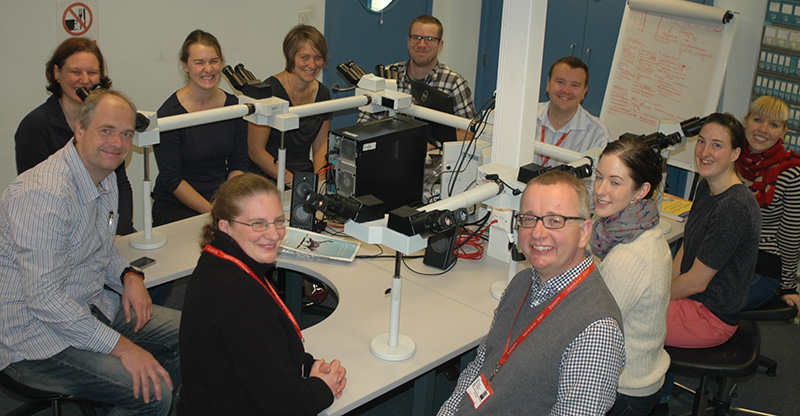RVC pathology trainees sweep the board in ACVP General Pathology examinations
Six Royal Veterinary College (RVC) trainees (residents) have passed the General Pathology examination that forms the first part of the Diploma qualification of the American College of Veterinary Pathologists (ACVP).
The ACVP is an organisation of specialist veterinary surgeons that has been setting the standard in veterinary pathology through rigorous examination and certification since 1949. The pathology examination process is one of the most challenging postgraduate veterinary qualifications in the world and until recently it was unusual for veterinary surgeons who had not trained in North America to obtain the qualification. Since 2006 the RVC Pathology Group, led by Prof Ken Smith, has been developing and applying a strategy to train veterinary graduates to achieve this prestigious goal. That strategy has involved RVC investment as well as funding from a variety of external sources including the horse racing industry, the pharmaceutical industry, commercial diagnostic laboratories, welfare charities and the Animal and Plant Health Agency (APHA: an executive agency, sponsored by the Department for Environment, Food & Rural Affairs).

Veterinary pathologists are integral to veterinary medicine and animal health and welfare in a variety of ways. For example whenever an animal has a surgical biopsy taken or a post mortem examination undertaken, the results are dependent on the specialist skills of a veterinary pathologist. Veterinary pathologists are also in the front line of disease surveillance – recent examples of this include the recognition of the new Schmallenberg virus in 2011 that caused malformations and pregnancy failures in the UK sheep flock the following spring. Animals share many of the same diseases as people and veterinary pathologists are in a unique position to recognise common mechanisms through comparative research – an example of this is diabetes in the cat which is very similar to type 2 diabetes in humans. The RVC is also leading the field in other areas of pathology. A good example of this is veterinary forensics where evidence gathered by the pathologist is often crucial to successful prosecutions for animal cruelty or neglect.
The RVC’s pathology training strategy to nurture the leaders of veterinary pathology in the 21st century is continuing to go from strength to strength and this year has produced the largest number of specialist pathology examination passes in the RVC’s long history.
Congratulations to our pathology trainees: Becca Terry (anatomic pathology: funded by The Wellcome Trust), Clare Muir (anatomic pathology: funded by Bridge Pathology), Alex Stoll (anatomic pathology: funded by the RVC), Sam Beck (anatomic pathology: co-funded by APHA and the RVC), Emma Holmes (clinical pathology: funded by the RVC) and Laureen Peters (clinical pathology: funded by the RVC).
Dr Simon Priestnall, Director of the Anatomic Pathology Residency Programme, said: “The RVC Pathology Group is incredibly proud of our trainees’ outstanding success - they are the next generation of veterinary pathologists”.
For more information about the RVC’s Pathology Training Programme please contact Dr Simon Priestnall (anatomic pathology: spriestnall@rvc.ac.uk) or Dr Balazs Szladovits (clinical pathology: bszladovits@rvc.ac.uk).

